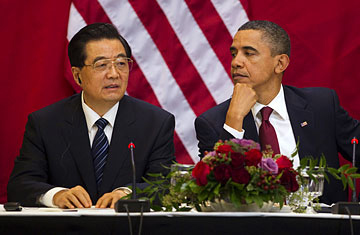
President Barack Obama looks on as China's President Hu Jintao speaks during a meeting with business leaders in Washington on Jan. 19, 2011
Whenever a Chinese leader goes to the U.S. for a summit with an American President, you can assume that several things will happen. There will be allusions to the 1979 meeting between Deng Xiaoping and Jimmy Carter, the first such meeting to take place in the U.S. There will be speeches calling for the two countries to find common ground despite different histories, values and political systems. The U.S. media will debate whether the White House is showing too much deference to the head of a brutal regime. The Chinese media will stress the respect a leader from Beijing is being accorded by the world's most powerful country — still true, despite the talk of America's decline. And then Henry Kissinger will get into the picture.
All of these things came to pass once again when President Hu called on President Obama in Washington. But take away the bromides and the benchmark of 1979, and what stands out is not just how much the world has changed but how far the two nations have moved away from the state of bilateral affairs during Deng's far more consequential and colorful trip across the Pacific.In 1979, Japan made headlines by floating the idea of offering loans to cash-strapped Beijing. In 2011, of course, when debts between countries are mentioned, the focus tends to be on the huge store of U.S. Treasury bills held by China, which surged past Japan this past summer to take the spot as the world's second biggest economy. In '79, the U.S.-China relationship was still shaped largely by a shared antipathy toward — and a common desire to limit the global reach of — the Soviet Union. This year marks the 20th anniversary of that country's disappearance.
When Deng ruled, he adopted a first-among-equals leadership mode that was much lower-key than Mao Zedong's bombastic personality cult. Today, China is governed by such colorless and consensus-focused figures that Deng appears in retrospect as a splashy and charismatic figure. In 1979, it seemed striking how far China had moved away from Mao's hostility toward capitalism. In 2011's hindsight, Deng appears to have merely taken a few baby steps in the direction that has led to a China whose rulers are addicted to high growth rates fueled by consumerism.
These contrasts are all significant, but there are two more that are perhaps even more noteworthy. One is the about-face that has taken place in American thinking about the desirability of China growing stronger. After the late American country singer John Denver sang his hit "Rocky Mountain High" at a gala for Deng and his wife, Denver told the guest of honor that he joined with other Americans in wishing China luck in its "new long march toward modernization." This echoed the view taken by many American politicians at the time, who expressed their support for Deng's pursuit of the "Four Modernizations," a program to build up China's strengths in agriculture, industry, military systems and science and technology.
As Warren Cohen, a leading historian of U.S. foreign policy, has noted, American support of China's development has a long pedigree. It goes back at least to a speech by Theodore Roosevelt in which he said it was "to the advantage, and not to the disadvantage, of other nations when any nation becomes stable and prosperous." Roosevelt went on to say that "the progress of China" was something all should "heartily" hope to see. Now, writes Cohen in the epilogue to the 2010 edition of his seminal survey America's Response to China: A History of Sino-American Relations, "in the early years of the new millennium, most Americans are not so sure that a strong China is in their nation's interest."
A final difference concerns the increasing global reach of the U.S.-China relationship. The Deng-Carter summit was watched with intense concern in capitals such as Tokyo and Moscow, but most elsewhere it was ignored or viewed as merely an interesting sideshow. Now, such meetings are widely seen as having the potential to affect every nation on the planet. Whether drama-filled or drama-free, they are treated as significant events that offer clues as to the strength or frailty of the world's most important bilateral relationship.
It's never been easy to manage this important relationship. New complications — or what Mao would have called new "contradictions," a favorite word of his — keep getting inserted every year into an already hard-to-balance equation. The U.S. today has to contend with Chinese leaders who insist that their country be accorded the respect a great power deserves — and claim that China remains so poor that it can't be expected to do as much as richer countries to combat environmental degradation. China, meanwhile, finds itself dealing with Americans who live in what is still the most economically and militarily powerful country in the world — and often mistakenly think that China is now richer than the U.S. and are obviously worried about seeing the sun set on the last-superpower-standing status their nation acquired when the Soviet Union imploded.
So much has changed since 1979 that a radical reboot of the time-honored U.S.-China script is clearly needed. And yet, in this current shape-shifting, high-anxiety era, it's difficult to imagine what such a reboot would entail. It's hardly surprising, then, that it felt best to all parties to simply go through the familiar paces one more time last week, when Mr. Hu went to Washington.
